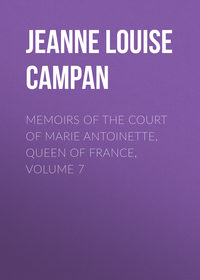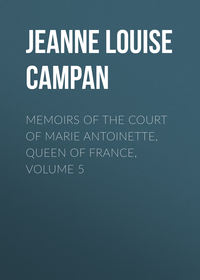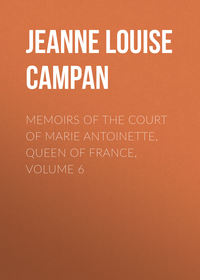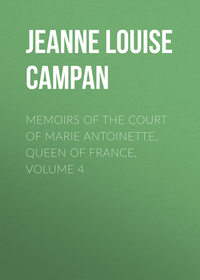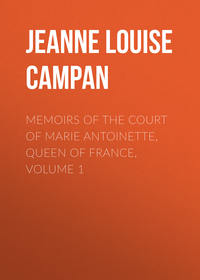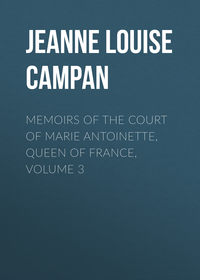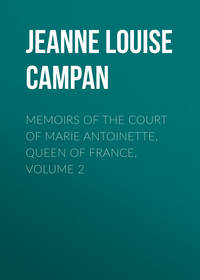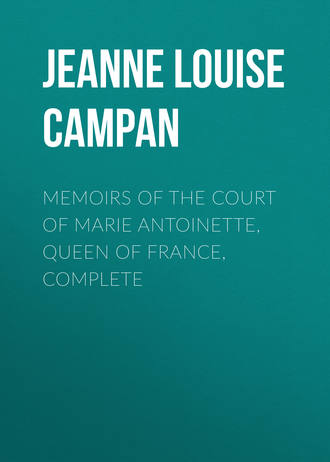 полная версия
полная версияMemoirs of the Court of Marie Antoinette, Queen of France, Complete
Madame de Jarjaye, my companion, who continued her functions during the whole period of my absence, told me that one night the commandant of battalion, who slept between the two doors, seeing that she was sleeping soundly, and that the Queen was awake, quitted his post and went close to her Majesty, to advise her as to the line of conduct she should pursue. Although she had the kindness to desire him to speak lower in order that he might not disturb Madame de Jarjaye’s rest, the latter awoke, and nearly died with fright at seeing a man in the uniform of the Parisian guard so near the Queen’s bed. Her Majesty comforted her, and told her not to rise; that the person she saw was a good Frenchman, who was deceived respecting the intentions and situation of his sovereign and herself, but whose conversation showed sincere attachment to the King.
There was a sentinel in the corridor which runs behind the apartments in question, where there is a staircase, which was at that time an inner one, and enabled the King and Queen to communicate freely. This post, which was very onerous, because it was to be kept four and twenty hours, was often claimed by Saint Prig, an actor belonging to the Theatre Francais. He took it upon himself sometimes to contrive brief interviews between the King and Queen in this corridor. He left them at a distance, and gave them warning if he heard the slightest noise. M. Collot, commandant of battalion of the National Guard, who was charged with the military duty of the Queen’s household, in like manner softened down, so far as he could with prudence, all, the revolting orders he received; for instance, one to follow the Queen to the very door of her wardrobe was never executed. An officer of the Parisian guard dared to speak insolently of the Queen in her own apartment. M. Collot wished to make a complaint to M. de La Fayette against him, and have him dismissed. The Queen opposed it, and condescended to say a few words of explanation and kindness to the man; he instantly became one of her most devoted partisans.
The first time I saw her Majesty after the unfortunate catastrophe of the Varennes journey, I found her getting out of bed; her features were not very much altered; but after the first kind words she uttered to me she took off her cap and desired me to observe the effect which grief had produced upon her hair. It had become, in one single night, as white as that of a woman of seventy. Her Majesty showed me a ring she had just had mounted for the Princesse de Lamballe; it contained a lock of her whitened hair, with the inscription, “Blanched by sorrow.” At the period of the acceptance of the constitution the Princess wished to return to France. The Queen, who had no expectation that tranquillity would be restored, opposed this; but the attachment of Madame de Lamballe to the royal family impelled her to come and seek death.
When I returned to Paris most of the harsh precautions were abandoned; the doors were not kept open; greater respect was paid to the sovereign; it was known that the constitution soon to be completed would be accepted, and a better order of things was hoped for.
CHAPTER VI
On my arrival at Paris on the 25th of August I found the state of feeling there much more temperate than I had dared to hope. The conversation generally ran upon the acceptance of the constitution, and the fetes which would be given in consequence. The struggle between the Jacobins and the constitutionals on the 17th of July, 1791, nevertheless had thrown the Queen into great terror for some moments; and the firing of the cannon from the Champ de Mars upon a party which called for a trial of the King, and the leaders of which were in the very bosom of the Assembly, left the most gloomy impressions upon her mind.
The constitutionals, the Queen’s connection with whom was not slackened by the intervention of the three members already mentioned, had faithfully served the royal family during their detention.
“We still hold the wire by which this popular mass is moved,” said Barnave to M. de J– one day, at the same time showing him a large volume, in which the names of all those who were influenced with the power of gold alone were registered. It was at that time proposed to hire a considerable number of persons in order to secure loud acclamations when the King and his family should make their appearance at the play upon the acceptance of the constitution. That day, which afforded a glimmering hope of tranquillity, was the 14th of September; the fetes were brilliant; but already fresh anxieties forbade the royal family to encourage much hope.
The Legislative Assembly, which had just succeeded the Constituent Assembly (October, 1791), founded its conduct upon the wildest republican principles; created from the midst of popular assemblies, it was wholly inspired by the spirit which animated them. The constitution, as I have said, was presented to the King on the 3d of September, 1791. The ministers, with the exception of M. de Montmorin, insisted upon the necessity of accepting the constitutional act in its entirety. The Prince de Kaunitz—[Minister of Austria]—was of the same opinion. Malouet wished the King to express himself candidly respecting any errors or dangers that he might observe in the constitution. But Duport and Barnave, alarmed at the spirit prevailing in the Jacobin Club, and even in the Assembly, where Robespierre had already denounced them as traitors to the country, and dreading still greater evils, added their opinions to those of the majority of the ministers and M. de Kaunitz; those who really desired that the constitution should be maintained advised that it should not be accepted thus literally. The King seemed inclined to this advice; and this is one of the strongest proofs of his sincerity.
[The extreme revolutionary party, so called from the club, originally “Breton,” then “Amis de la Constitution,” sitting at the convent of the Dominicans (called in France Jacobins) of the Rue Saint Honore.]
Alexandre Lameth, Duport, and Barnave, still relying on the resources of their party, hoped to have credit for directing the King through the influence they believed they had acquired over the mind of the Queen. They also consulted people of acknowledged talent, but belonging to no council nor to any assembly. Among these was M. Dubucq, formerly intendant of the marine and of the colonies. He answered laconically in one phrase: “Prevent disorder from organising itself.”
The letter written by the King to the Assembly, claiming to accept the constitution in the very place where it had been created, and where he announced he would be on the 14th September at mid-day, was received with transport, and the reading was repeatedly interrupted by plaudits. The sitting terminated amidst the greatest enthusiasm, and M. de La Fayette obtained the release of all those who were detained on account of the King’s journey [to Varennes], the abandonment of all proceedings relative to the events of the Revolution, and the discontinuance of the use of passports and of temporary restraints upon free travelling, as well in the interior as without. The whole was conceded by acclamation. Sixty members were deputed to go to the King and express to him fully the satisfaction his Majesty’s letter had given. The Keeper of the Seals quitted the chamber, in the midst of applause, to precede the deputation to the King.
The King answered the speech addressed to him, and concluded by saying to the Assembly that a decree of that morning, which had abolished the order of the Holy Ghost, had left him and his son alone permission to be decorated with it; but that an order having no value in his eyes, save for the power of conferring it, he would not use it.
The Queen, her son, and Madame, were at the door of the chamber into which the deputation was admitted. The King said to the deputies, “You see there my wife and children, who participate in my sentiments;” and the Queen herself confirmed the King’s assurance. These apparent marks of confidence were very inconsistent with the agitated state of her mind. “These people want no sovereigns,” said she. “We shall fall before their treacherous though well-planned tactics; they are demolishing the monarchy stone by stone.”
Next day the particulars of the reception of the deputies by the King were reported to the Assembly, and excited warm approbation. But the President having put the question whether the Assembly ought not to remain seated while the King took the oath “Certainly,” was repeated by many voices; “and the King, standing, uncovered.” M. Malouet observed that there was no occasion on which the nation, assembled in the presence of the King, did not acknowledge him as its head; that the omission to treat the head of the State with the respect due to him would be an offence to the nation, as well as to the monarch. He moved that the King should take the oath standing, and that the Assembly should also stand while he was doing so. M. Malouet’s observations would have carried the decree, but a deputy from Brittany exclaimed, with a shrill voice, that he had an amendment to propose which would render all unanimous. “Let us decree,” said he, “that M. Malouet, and whoever else shall so please, may have leave to receive the King upon their knees; but let us stick to the decree.”
The King repaired to the chamber at mid-day. His speech was followed by plaudits which lasted several minutes. After the signing of the constitutional act all sat down. The President rose to deliver his speech; but after he had begun, perceiving that the King did not rise to hear him, he sat down again. His speech made a powerful impression; the sentence with which it concluded excited fresh acclamations, cries of “Bravo!” and “Vive le Roi!”—“Sire,” said he, “how important in our eyes, and how dear to our hearts—how sublime a feature in our history—must be the epoch of that regeneration which gives citizens to France, and a country to Frenchmen,—to you, as a king, a new title of greatness and glory, and, as a man, a source of new enjoyment.” The whole Assembly accompanied the King on his return, amidst the people’s cries of happiness, military music, and salvoes of artillery.
At length I hoped to see a return of that tranquillity which had so long vanished from the countenances of my august master and mistress. Their suite left them in the salon; the Queen hastily saluted the ladies, and returned much affected; the King followed her, and, throwing himself into an armchair, put his handkerchief to his eyes. “Ah! Madame,” cried he, his voice choked by tears, “why were you present at this sitting? to witness—” these words were interrupted by sobs. The Queen threw herself upon her knees before him, and pressed him in her arms. I remained with them, not from any blamable curiosity, but from a stupefaction which rendered me incapable of determining what I ought to do. The Queen said to me, “Oh! go, go!” with an accent which expressed, “Do not remain to see the dejection and despair of your sovereign!” I withdrew, struck with the contrast between the shouts of joy without the palace and the profound grief which oppressed the sovereigns within. Half an hour afterwards the Queen sent for me. She desired to see M. de Goguelat, to announce to him his departure on that very night for Vienna. The renewed attacks upon the dignity of the throne which had been made during the sitting; the spirit of an Assembly worse than the former; the monarch put upon a level with the President, without any deference to the throne,—all this proclaimed but too loudly that the sovereignty itself was aimed at. The Queen no longer saw any ground for hope from the Provinces. The King wrote to the Emperor; she told me that she would herself, at midnight, bring the letter which M. de Goguelat was to bear to the Emperor, to my room.
During all the remainder of the day the Chateau and the Tuileries were crowded; the illuminations were magnificent. The King and Queen were requested to take an airing in their carriage in the Champs-Elysees, escorted by the aides-decamp, and leaders of the Parisian army, the Constitutional Guard not being at the time organised. Many shouts of “Vive le Roi!” were heard; but as often as they ceased, one of the mob, who never quitted the door of the King’s carriage for a single instant, exclaimed with a stentorian voice, “No, don’t believe them! Vive la Nation!” This ill-omened cry struck terror into the Queen.
A few days afterwards M. de Montmorin sent to say he wanted to speak to me; that he would come to me, if he were not apprehensive his doing so would attract observation; and that he thought it would appear less conspicuous if he should see me in the Queen’s great closet at a time which he specified, and when nobody would be there. I went. After having made some polite observations upon the services I had already performed, and those I might yet perform, for my master and mistress, he spoke to me of the King’s imminent danger, of the plots which were hatching, and of the lamentable composition of the Legislative Assembly; and he particularly dwelt upon the necessity of appearing, by prudent remarks, determined as much as possible to abide by the act the King had just recognised. I told him that could not be done without committing ourselves in the eyes of the royalist party, with which moderation was a crime; that it was painful to hear ourselves taxed with being constitutionalists, at the same time that it was our opinion that the only constitution which was consistent with the King’s honour, and the happiness and tranquillity of his people, was the absolute power of the sovereign; that this was my creed, and it would pain me to give any room for suspicion that I was wavering in it.
“Could you ever believe,” said he, “that I should desire any other order of things? Have you any doubt of my attachment to the King’s person, and the maintenance of his rights?”
“I know it, Count,” replied I; “but you are not ignorant that you lie under the imputation of having adopted revolutionary ideas.”
“Well, madame, have resolution enough to dissemble and to conceal your real sentiments; dissimulation was never more necessary. Endeavours are being made to paralyse the evil intentions of the factious as much as possible; but we must not be counteracted here by certain dangerous expressions which are circulated in Paris as coming from the King and Queen.”
I told him that I had been already struck with apprehension of the evil which might be done by the intemperate observations of persons who had no power to act; and that I had felt ill consequences from having repeatedly enjoined silence on those in the Queen’s service.
“I know that,” said the Count; “the Queen informed me of it, and that determined me to come and request you to increase and keep alive, as much as you can, that spirit of discretion which is so necessary.”
While the household of the King and Queen were a prey to all these fears, the festivities in celebration of the acceptance of the constitution proceeded. Their Majesties went to the Opera; the audience consisted entirely of persons who sided with the King, and on that day the happiness of seeing him for a short time surrounded by faithful subjects might be enjoyed. The acclamations were then sincere.
“La Coquette Corrigee” had been selected for representation at the Theatre Francais solely because it was the piece in which Mademoiselle Contat shone most. Yet the notions propagated by the Queen’s enemies coinciding in my mind with the name of the play, I thought the choice very ill-judged. I was at a loss, however, how to tell her Majesty so; but sincere attachment gives courage. I explained myself; she was obliged to me, and desired that another play might be performed. They accordingly selected “La Gouvernante,” almost equally unfortunate in title.
The Queen, Madame the King’s daughter, and Madame Elisabeth were all well received on this occasion. It is true that the opinions and feelings of the spectators in the boxes could not be otherwise than favourable, and great pains had been taken, previously to these two performances, to fill the pit with proper persons. But, on the other hand, the Jacobins took the same precautions on their side at the Theatre Italien, and the tumult was excessive there. The play was Gretry’s “Les Evenements Imprevus.” Unfortunately, Madame Dugazon thought proper to bow to the Queen as she sang the words, “Ah, how I love my mistress!” in a duet. Above twenty voices immediately exclaimed from the pit, “No mistress! no master! liberty!” A few replied from the boxes and slips, “Vive le Roi! vive la Reine!” Those in the pit answered, “No master! no Queen!” The quarrel increased; the pit formed into parties; they began fighting, and the Jacobins were beaten; tufts of their black hair flew about the theatre.—[At this time none but the Jacobins had discontinued the use of hairpowder.—MADAME CAMPAN.]—A military guard arrived. The Faubourg St. Antoine, hearing of what was going on at the Theatre Italien, flocked together, and began to talk of marching towards the scene of action. The Queen preserved the calmest demeanour; the commandants of the guard surrounded and encouraged her; they conducted themselves promptly and discreetly. No accident happened. The Queen was highly applauded as she quitted the theatre; it was the last time she was ever in one!
While couriers were bearing confidential letters from the King to the Princes, his brothers, and to the foreign sovereigns, the Assembly invited him to write to the Princes in order to induce them to return to France. The King desired the Abbe de Montesquiou to write the letter he was to send; this letter, which was admirably composed in a simple and affecting style, suited to the character of Louis XVI., and filled with very powerful arguments in favour of the advantages to be derived from adopting the principles of the constitution, was confided to me by the King, who desired me to make him a copy of it.
At this period M. M–, one of the intendants of Monsieur’s household, obtained a passport from the Assembly to join that Prince on business relative to his domestic concerns. The Queen selected him to be the bearer of this letter. She determined to give it to him herself, and to inform him of its object. I was astonished at her choice of this courier. The Queen assured me he was exactly the man for her purpose, that she relied even upon his indiscretion, and that it was merely necessary that the letter from the King to his brothers should be known to exist. The Princes were doubtless informed beforehand on the subject by the private correspondence. Monsieur nevertheless manifested some degree of surprise, and the messenger returned more grieved than pleased at this mark of confidence, which nearly cost him his life during the Reign of Terror.
Among the causes of uneasiness to the Queen there was one which was but too well founded, the thoughtlessness of the French whom she sent to foreign Courts. She used to say that they had no sooner passed the frontiers than they disclosed the most secret matters relative to the King’s private sentiments, and that the leaders of the Revolution were informed of them through their agents, many of whom were Frenchmen who passed themselves off as emigrants in the cause of their King.
After the acceptance of the constitution, the formation of the King’s household, as well military as civil, formed a subject of attention. The Duc de Brissac had the command of the Constitutional Guard, which was composed of officers and men selected from the regiments, and of several officers drawn from the National Guard of Paris. The King was satisfied with the feelings and conduct of this band, which, as is well known, existed but a very short time.
The new constitution abolished what were called honours, and the prerogatives belonging to them. The Duchesse de Duras resigned her place of lady of the bedchamber, not choosing to lose her right to the tabouret at Court. This step hurt the Queen, who saw herself forsaken through the loss of a petty privilege at a time when her own rights and even life were so hotly attacked. Many ladies of rank left the Court for the same reason. However, the King and Queen did not dare to form the civil part of their household, lest by giving the new names of the posts they should acknowledge the abolition of the old ones, and also lest they should admit into the highest positions persons not calculated to fill them well. Some time was spent in discussing the question, whether the household should be formed without chevaliers and without ladies of honour. The Queen’s constitutional advisers were of opinion that the Assembly, having decreed a civil list adequate to uphold the splendour of the throne, would be dissatisfied at seeing the King adopting only a military household, and not forming his civil household upon the new constitutional plan. “How is it, Madame,” wrote Barnave to the Queen, “that you will persist in giving these people even the smallest doubt as to your sentiments? When they decree you a civil and a military household, you, like young Achilles among the daughters of Lycomedes, eagerly seize the sword and scorn the mere ornaments.” The Queen persisted in her determination to have no civil household. “If,” said she, “this constitutional household be formed, not a single person of rank will remain with us, and upon a change of affairs we should be obliged to discharge the persons received into their place.”
“Perhaps,” added she, “perhaps I might find one day that I had saved the nobility, if I now had resolution enough to afflict them for a time; I have it not. When any measure which injures them is wrested from us they sulk with me; nobody comes to my card party; the King goes unattended to bed. No allowance is made for political necessity; we are punished for our very misfortunes.”
The Queen wrote almost all day, and spent part of the night in reading: her courage supported her physical strength; her disposition was not at all soured by misfortunes, and she was never seen in an ill-humour for a moment. She was, however, held up to the people as a woman absolutely furious and mad whenever the rights of the Crown were in any way attacked.
I was with her one day at one of her windows. We saw a man plainly dressed, like an ecclesiastic, surrounded by an immense crowd. The Queen imagined it was some abbe whom they were about to throw into the basin of the Tuileries; she hastily opened her window and sent a valet de chambre to know what was going forward in the garden. It was Abbe Gregoire, whom the men and women of the tribunes were bringing back in triumph, on account of a motion he had just made in the National Assembly against the royal authority. On the following day the democratic journalists described the Queen as witnessing this triumph, and showing, by expressive gestures at her window, how highly she was exasperated by the honours conferred upon the patriot.
The correspondence between the Queen and the foreign powers was carried on in cipher. That to which she gave the preference can never be detected; but the greatest patience is requisite for its use. Each correspondent must have a copy of the same edition of some work. She selected “Paul and Virginia.” The page and line in which the letters required, and occasionally a monosyllable, are to be found are pointed out in ciphers agreed upon. I assisted her in finding the letters, and frequently I made an exact copy for her of all that she had ciphered, without knowing a single word of its meaning.
There were always several secret committees in Paris occupied in collecting information for the King respecting the measures of the factions, and in influencing some of the committees of the Assembly. M. Bertrand de Molleville was in close correspondence with the Queen. The King employed M. Talon and others; much money was expended through the latter channel for the secret measures. The Queen had no confidence in them. M. de Laporte, minister of the civil list and of the household, also attempted to give a bias to public opinion by means of hireling publications; but these papers influenced none but the royalist party, which did not need influencing. M. de Laporte had a private police which gave him some useful information.
I determined to sacrifice myself to my duty, but by no means to any intrigue, and I thought that, circumstanced as I was, I ought to confine myself to obeying the Queen’s orders. I frequently sent off couriers to foreign countries, and they were never discovered, so many precautions did I take. I am indebted for the preservation of my own existence to the care I took never to admit any deputy to my abode, and to refuse all interviews which even people of the highest importance often requested of me; but this line of conduct exposed me to every species of ill-will, and on the same day I saw myself denounced by Prud’homme, in his ‘Gazette Revolutionnaire’, as capable of making an aristocrat of the mother of the Gracchi, if a person so dangerous as myself could have got into her household; and by Gauthier’s Gazette Royaliste, as a monarchist, a constitutionalist, more dangerous to the Queen’s interests than a Jacobin.


